Hottest Virtual Reality Games 2023
Virtual Reality Game System
A virtual reality game system, commonly referred to as a VR gaming system, is a technology platform that enables users to immerse themselves in virtual worlds and interact with them through the use of virtual reality technology.

- VR Headset: The VR headset is a specialized display device that users wear over their eyes. It typically includes two screens, one for each eye, to create a stereoscopic 3D effect. The headset also contains sensors to track the user’s head movements and position, allowing them to look around and navigate the virtual environment.
- Tracking System: A tracking system is used to monitor the user’s movements in physical space. This can involve external cameras or sensors that track the position of the headset and handheld controllers, enabling precise tracking of the user’s movements.
- Handheld Controllers: VR systems often come with handheld controllers that allow users to interact with objects and the virtual world. These controllers are usually tracked in 3D space, enabling gestures and actions to be translated into the virtual environment.
- Computer or Console: VR gaming systems typically require a powerful computer or gaming console to render the complex 3D graphics and run the VR software. The system’s performance is crucial in delivering a smooth and immersive VR experience.
- Audio System: High-quality audio is a critical component of the VR experience. Many VR headsets include built-in headphones or support external audio solutions for a more immersive sound experience.
- Content and Software: VR gaming systems rely on a library of VR-specific games and applications. These games are often designed to fully utilize the VR environment, offering unique gameplay experiences.


There are several popular VR gaming platforms on the market, including:
- Oculus (now Meta Quest): Oculus, now part of Meta (formerly Facebook), offers a range of VR headsets, including the Oculus Quest and Quest 2, which are standalone VR systems, as well as the Rift and Rift S, which are tethered to a PC.
- HTC Vive: The HTC Vive series is known for its high-quality VR experiences and offers both tethered and standalone VR options, such as the Vive Pro and Vive Cosmos.
- PlayStation VR: Sony’s PlayStation VR system is designed for use with the PlayStation 4 and PlayStation 5 gaming consoles, providing a VR gaming experience tailored to the PlayStation ecosystem.
- Valve Index: Valve’s Index system is designed for high-end PC gaming and offers a wide field of view, precise tracking, and finger-tracking controllers.
- Windows Mixed Reality: Microsoft’s Windows Mixed Reality platform offers a range of VR headsets from various manufacturers, designed for use with Windows 10 PCs.

